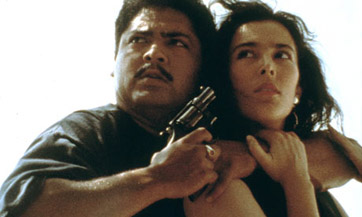Viking Night: El Mariachi
By Bruce Hall
June 3, 2014
BoxOfficeProphets.com

But you wouldn't know it at first. The first ten minutes of El Mariachi look very much like someone sold their body to science to make it. It has an infectiously trashy B-movie feel to it, with lots of awkward handheld shots, and more lingering character close-ups than a Mexican soap opera. And it’s all accompanied by a thrumming, John Carpenter-esque synthesizer score that sounds like it was written by a machine. Still, underneath the threadbare look and feel is some tremendous competence and immense confidence. Not a lot of money was spent, but what was got spent very well.
It all starts in a scummy jail in a sleepy Mexican border town. There, a notorious bandit named Azul (Reynold Martinez) runs his empire from behind bars using a cell phone so big it needs a strap. He’s behind bars courtesy of his former cohort Moco (Peter Marquardt), who rolled on his partner to save himself. Now, in a particularly bold example of douchebaggery, Moco sends a hit squad to silence his old friend, and places a well-timed call to the Super Giant Cell Phone so he can hear the whole thing.
Unfortunately for Moco, The hit goes sideways. Azul escapes, and is understandably eager to discuss the situation with his would be killer - if by “discuss” you mean “shoot him in the face until he doesn’t have a face anymore.” To facilitate this, Azul commands his men to produce a guitar case filled with enough weapons to play Grand Theft Auto IV twice without reloading. Then, he sets out for revenge.
Meanwhile, a handsome young mariachi (Carlos Gallardo) arrives in town with nothing but his guitar and the clothes on his back. He’s an idealistic guy who shuns technology, lives off his charm and doesn’t drink anything harder than grape soda. He starts hitting up local bars, looking for a job. It's slim pickings, as nobody seems to have any use for a silver tongued traveling troubadour. One of the bars the Mariachi visits is a gangster hangout, and when Azul subsequently shows up and ventilates the place, all anyone can remember is that it was a man in black carrying a guitar case.
You can see where this is going, right? Moco calls out a hit on anyone wearing black and carrying a guitar case. About a half hour later, the Mariachi finds himself beset by assassins and cutthroats. It’s only with the help of a beautiful barmaid named Domino (Consuelo Gomez) that he’s able to get a break - but not without putting his most prized possession at risk. And I’m not talking about the guitar.
It’s a simple story set in a simple place, and this is a big part of what makes El Mariachi work. Rodriguez manages to do more with less in ways that should make Roger Corman jealous. Nothing is wasted either in material or screen time. The story takes a moment to get going, but never stops moving once it’s in motion. The action revolves almost exclusively around a handful of characters - Azul, Moco, Domino, and the Mariachi form a nucleus of suffering and destruction around which everything in the film orbits.
Moco spends most of the film sitting by the pool. He looks like an evil, Latin James Spader, belittling his girlfriend as he barks orders into a cordless phone - just the way a proper Miami Vice villain should. Azul isn’t the sharpest knife in the guitar case - which is probably how he ended up in jail in the first place. When the Mariachi’s exploits eventually start getting blamed on him, even he seems willing to concede he’s too lazy to kill that many people. Domino has little to do but give the Mariachi a reason to stay in town, but there’s an outstanding musical number involving a letter opener that allows me to overlook this. And as for the Mariachi himself, he is hands down one of the most memorable protagonists of the last 25 years.
Rodriguez achieved a very rare thing here, and that’s to successfully mesh disparate genres into something that entertains in fresh ways. His film is part Western, part Greek tragedy, part gangster flick and one hundred percent re-watchable. Perhaps the best part of all is the fact that like all the best Westerns, it has a damn fine ending. The only negativity I can offer here is that it's a shame Rodriguez didn't have more money to make this the way he wanted. Then again, maybe it's not. Having so little to work with, and having so few who share your vision can occasionally make you work smarter. Suffering for your art sucks, but sometimes it's also the greatest muse of all. The wayfaring mariachi, traveling virtuoso and living link to a proud, lonesome ancestry – is one of the few who could understand this.